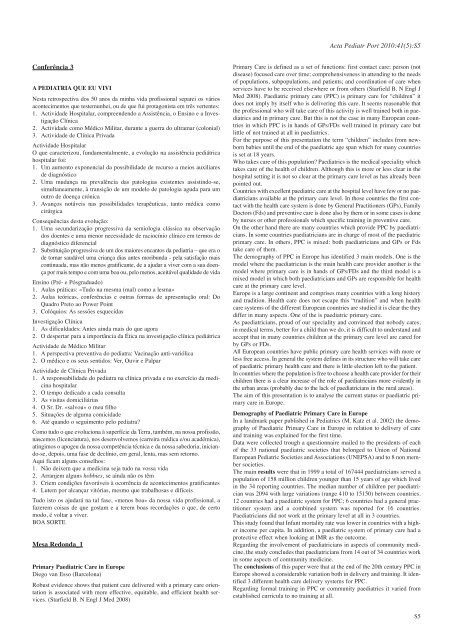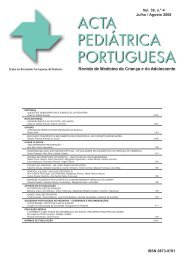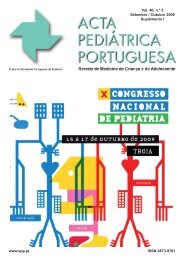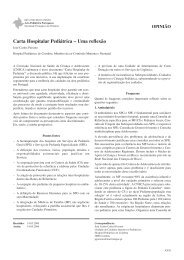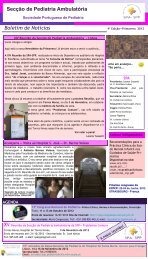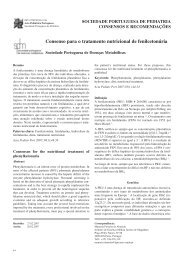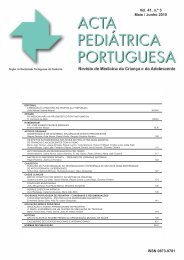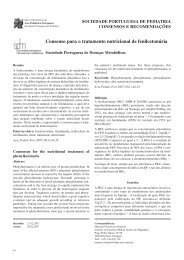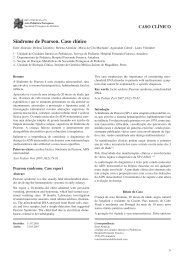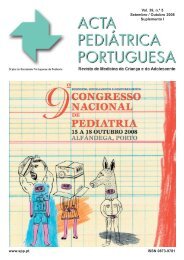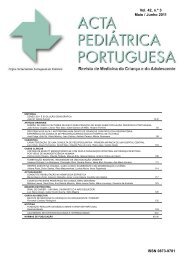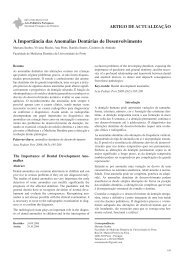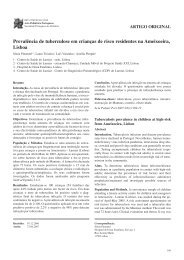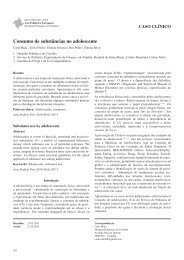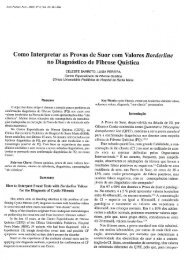acta pediátrica portuguesa - Sociedade Portuguesa de Pediatria
acta pediátrica portuguesa - Sociedade Portuguesa de Pediatria
acta pediátrica portuguesa - Sociedade Portuguesa de Pediatria
Create successful ePaper yourself
Turn your PDF publications into a flip-book with our unique Google optimized e-Paper software.
Acta Pediatr Port 2010:41(5):S5<br />
Conferência 3<br />
A PEDIATRIA QUE EU VIVI<br />
Nesta retrospectiva dos 50 anos da minha vida profissional separei os vários<br />
acontecimentos que testemunhei, ou <strong>de</strong> que fui protagonista em três vertentes:<br />
1. Activida<strong>de</strong> Hospitalar, compreen<strong>de</strong>ndo a Assistência, o Ensino e a Inves -<br />
tigação Clínica<br />
2. Activida<strong>de</strong> como Médico Militar, durante a guerra do ultramar (colonial)<br />
3. Activida<strong>de</strong> <strong>de</strong> Clínica Privada<br />
Activida<strong>de</strong> Hospitalar<br />
O que caracterizou, fundamentalmente, a evolução na assistência pediátrica<br />
hospitalar foi:<br />
1. Um aumento exponencial da possibilida<strong>de</strong> <strong>de</strong> recurso a meios auxiliares<br />
<strong>de</strong> diagnóstico<br />
2. Uma mudança na prevalência das patologias existentes assistindo-se,<br />
simultaneamente, à transição <strong>de</strong> um mo<strong>de</strong>lo <strong>de</strong> patologia aguda para um<br />
outro <strong>de</strong> doença crónica<br />
3. Avanços notáveis nas possibilida<strong>de</strong>s terapêuticas, tanto médica como<br />
cirúrgica<br />
Consequências <strong>de</strong>sta evolução:<br />
1. Uma secundarização progressiva da semiologia clássica na observação<br />
dos doentes e uma menor necessida<strong>de</strong> <strong>de</strong> raciocínio clínico em termos <strong>de</strong><br />
diagnóstico diferencial<br />
2. Substituição progressiva <strong>de</strong> um dos maiores encantos da pediatria – que era o<br />
<strong>de</strong> tornar saudável uma criança dias antes moribunda - pela satisfação mais<br />
continuada, mas não menos gratificante, <strong>de</strong> a ajudar a viver com a sua doença<br />
por mais tempo e com uma boa ou, pelo menos, aceitável qualida<strong>de</strong> <strong>de</strong> vida<br />
Ensino (Pré- e Pósgraduado)<br />
1. Aulas práticas: «Tudo na mesma (mal) como a lesma»<br />
2. Aulas teóricas, conferências e outras formas <strong>de</strong> apresentação oral: Do<br />
Quadro Preto ao Power Point<br />
3. Colóquios: As sessões esquecidas<br />
Investigação Clínica<br />
1. As dificulda<strong>de</strong>s: Antes ainda mais do que agora<br />
2. O <strong>de</strong>spertar para a importância da Ética na investigação clínica pediátrica<br />
Activida<strong>de</strong> <strong>de</strong> Médico Militar<br />
1. A perspectiva preventiva do pediatra: Vacinação anti-variólica<br />
2. O médico e os seus sentidos: Ver, Ouvir e Palpar<br />
Activida<strong>de</strong> <strong>de</strong> Clínica Privada<br />
1. A responsabilida<strong>de</strong> do pediatra na clínica privada e no exercício da medicina<br />
hospitalar<br />
2. O tempo <strong>de</strong>dicado a cada consulta<br />
3. As visitas domiciliárias<br />
4. O Sr. Dr. «salvou» o meu filho<br />
5. Situações <strong>de</strong> alguma comicida<strong>de</strong><br />
6. Até quando o seguimento pelo pediatra?<br />
Como tudo o que evoluciona à superfície da Terra, também, na nossa profissão,<br />
nascemos (licenciatura), nos <strong>de</strong>senvolvemos (carreira médica e/ou académica),<br />
atingimos o apogeu da nossa competência técnica e da nossa sabedoria, iniciando-se,<br />
<strong>de</strong>pois, uma fase <strong>de</strong> <strong>de</strong>clínio, em geral, lenta, mas sem retorno.<br />
Aqui ficam alguns conselhos:<br />
1. Não <strong>de</strong>ixem que a medicina seja tudo na vossa vida<br />
2. Arranjem alguns hobbies, se ainda não os têm<br />
3. Criem condições favoráveis à ocorrência <strong>de</strong> acontecimentos gratificantes<br />
4. Lutem por alcançar vitórias, mesmo que trabalhosas e difíceis<br />
Tudo isto os ajudará na tal fase, «menos boa» da nossa vida profissional, a<br />
fazerem coisas <strong>de</strong> que gostam e a terem boas recordações o que, <strong>de</strong> certo<br />
modo, é voltar a viver.<br />
BOA SORTE<br />
Mesa Redonda_1<br />
Primary Paediatric Care in Europe<br />
Diego van Esso (Barcelona)<br />
Robust evi<strong>de</strong>nce shows that patient care <strong>de</strong>livered with a primary care orientation<br />
is associated with more effective, equitable, and efficient health ser -<br />
vices. (Starfield B. N Engl J Med 2008)<br />
Primary Care is <strong>de</strong>fined as a set of functions: first contact care; person (not<br />
disease) focused care over time; comprehensiveness in attending to the needs<br />
of populations, subpopulations, and patients; and coordination of care when<br />
services have to be received elsewhere or from others (Starfield B. N Engl J<br />
Med 2008). Paediatric primary care (PPC) is primary care for “children” it<br />
does not imply by itself who is <strong>de</strong>livering this care. It seems reasonable that<br />
the professional who will take care of this activity is well trained both in paediatrics<br />
and in primary care. But this is not the case in many European countries<br />
in which PPC is in hands of GPs/FDs well trained in primary care but<br />
little of not trained at all in paediatrics.<br />
For the purpose of this presentation the term “children” inclu<strong>de</strong>s from newborn<br />
babies until the end of the paediatric age span which for many countries<br />
is set at 18 years.<br />
Who takes care of this population? Paediatrics is the medical speciality which<br />
takes care of the health of children. Although this is more or less clear in the<br />
hospital setting it is not so clear at the primary care level as has already been<br />
pointed out.<br />
Countries with excellent paediatric care at the hospital level have few or no paediatricians<br />
available at the primary care level. In those countries the first contact<br />
with the health care system is done by General Practitioners (GPs), Family<br />
Doctors (Fds) and preventive care is done also by them or in some cases is done<br />
by nurses or other professionals which specific training in preventive care.<br />
On the other hand there are many countries which provi<strong>de</strong> PPC by paediatricians.<br />
In some countries paediatricians are in charge of most of the paediatric<br />
primary care. In others, PPC is mixed: both paediatricians and GPs or Fds<br />
take care of them.<br />
The <strong>de</strong>mography of PPC in Europe has i<strong>de</strong>ntified 3 main mo<strong>de</strong>ls. One is the<br />
mo<strong>de</strong>l where the paediatrician is the main health care provi<strong>de</strong>r another is the<br />
mo<strong>de</strong>l where primary care is in hands of GPs/FDs and the third mo<strong>de</strong>l is a<br />
mixed mo<strong>de</strong>l in which both paediatricians and GPs are responsible for health<br />
care at the primary care level.<br />
Europe is a large continent and comprises many countries with a long his tory<br />
and tradition. Health care does not escape this “tradition” and when health<br />
care systems of the different European countries are studied it is clear the they<br />
differ in many aspects. One of the is paediatric primary care.<br />
As paediatricians, proud of our speciality and convinced that nobody cares,<br />
in medical terms, better for a child than we do, it is difficult to un<strong>de</strong>rstand and<br />
accept that in many countries children at the primary care level are cared for<br />
by GPs or FDs.<br />
All European countries have public primary care health services with more or<br />
less free access. In general the system <strong>de</strong>fines in its structure who will take care<br />
of paediatric primary health care and there is little election left to the patient.<br />
In countries where the population is free to choose a health care provi<strong>de</strong>r for their<br />
children there is a clear increase of the role of paediatricians more evi<strong>de</strong>ntly in<br />
the urban areas (probably due to the lack of paediatricians in the rural areas).<br />
The aim of this presentation is to analyse the current status or paediatric primary<br />
care in Europe.<br />
Demography of Paediatric Primary Care in Europe<br />
In a landmark paper published in Pediatrics (M. Katz et al. 2002) the <strong>de</strong>mo -<br />
graphy of Paediatric Primary Care in Europe in relation to <strong>de</strong>livery of care<br />
and training was explained for the first time.<br />
Data were collected trough a questionnaire mailed to the presi<strong>de</strong>nts of each<br />
of the 33 national paediatric societies that belonged to Union of National<br />
European Pediatric Societies and Associations (UNEPSA) and to 8 non member<br />
societies.<br />
The main results were that in 1999 a total of 167444 paediatricians served a<br />
population of 158 million children younger than 15 years of age which lived<br />
in the 34 reporting countries. The median number of children per paediatrician<br />
was 2094 with large variations (range 410 to 15150) between countries.<br />
12 countries had a paediatric system for PPC; 6 countries had a general practitioner<br />
system and a combined system was reported for 16 countries.<br />
Paediatricians did not work at the primary level at all in 3 countries.<br />
This study found that Infant mortality rate was lower in countries with a higher<br />
income per capita. In addition, a paediatric system of primary care had a<br />
protective effect when looking at IMR as the outcome.<br />
Regarding the involvement of paediatricians in aspects of community medicine,<br />
the study conclu<strong>de</strong>s that paediatricians from 14 out of 34 countries work<br />
in some aspects of community medicine.<br />
The conclusions of this paper were that at the end of the 20th century PPC in<br />
Europe showed a consi<strong>de</strong>rable variation both in <strong>de</strong>livery and training. It i<strong>de</strong>ntified<br />
3 different health care <strong>de</strong>livery systems for PPC.<br />
Regarding formal training in PPC or community paediatrics it varied from<br />
established curricula to no training at all.<br />
S5


